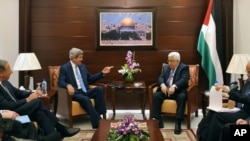“I wouldn’t start chilling the champagne yet,” Ilan Peleg, a scholar at the Middle East Institute in Washington, said after Kerry announced July 19 that Israelis and Palestinians had “established a basis” for resuming peace talks.
Peleg’s caution may be wise. The Israeli-Palestinian dispute goes back even before Israel became a state 65 years ago, and repeated attempts to solve it have failed.
Kerry’s latest diplomatic push centers around the same peace framework that has been on the table for more than three decades – creation of a separate Palestinian state on territory known as the West Bank between Israel and the Jordan River.
This time the main players are Israeli Prime Minister Benjamin Netanyahu and Mahmoud Abbas, president of the Palestinian Authority, which represents West Bank Palestinians.
“Kerry apparently has put enormous pressure on Abu Mazen [Abbas] to come around and begin discussions with no pre-conditions,” said Peleg, who is also a professor of government and law at Lafayette College. “There might have been even an explicit threat of cutting off American aid to the Palestinian Authority…”
Abbas has reportedly insisted that Israel agree to one of three conditions for peace talks: The release of 103 long-term Palestinian prisoners from Israeli jails, a freeze on Israeli settlements in the West Bank or a return to the borders as they were before the 1967 Middle East war.
Israeli intelligence minister Yuval Steinitz said this week Israel might release 82 prisoners, but only after peace talks are underway.
“Netanyahu’s maximal concessions still do not meet Abu Mazen’s minimal demands, and I believe this will become clear as the negotiations evolve,” Peleg said. “Bibi [Netanyahu] has insisted that negotiations should not be based on the 1967 lines... The bottom line is that U.N. Resolution 242 requires Israeli withdrawal on all fronts—Sinai, Golan, West Bank—and that the lines of June 4, 1967 are indeed the lines at the ‘basis’ of negotiations on establishing new lines.”
The problem is that any Israeli withdrawal from the West Bank would involve abandoning scores of Jewish settlements set up in the region since 1967, settlements in which more than 300,000 Israelis live.
And construction of Israeli West Bank settlements has always been a “deal killer,” says Peleg. He says it is not known what, if any, concessions have been made on this issue, but if settlement building continues in the West Bank, he believes even a minimalist deal would be impossible.
No more 'Mitsubishi agreements'
Meanwhile, Netanyahu is pushing a bill in the Israeli parliament, or Knesset, that would require any peace agreement to be approved not just by the government, but by public referendum. Current law requires a referendum only if sovereign territory is to be given up to the Palestinians.
Some have suggested that the Netanyahu’s push for a referendum is either stalling for time or an attempt to shift responsibility for what would be an unpopular decision. But others see it as a move to appease opposition from the right of Netanyahu’s governing coalition.
And Naftali Bennett, the economics minister and chairman of the Bayit Yehudi party, is making Netanyahu’s task even more difficult by insisting that there be no more “Mitsubishi agreements.”
Bennett’s reference is to a Knesset vote more than two decades ago on a peace initiative of the time, the so-called Oslo Accords. To win a majority vote, then-Prime Minister Yitzhak Rabin reportedly promised a certain member of the Knesset a deputy-ministerial position and a private Mitsubishi automobile.
“A national referendum is the only way to prevent the country from tearing apart,” Bennett recently said.
Hard to get
Given the obstacles, Brent E. Sasley, a Middle East scholar and assistant professor at the University of Texas at Arlington, is wondering if this latest peace initiative will get off the ground.
“Right now, what we are seeing is both sides essentially playing to their own domestic audiences by throwing in different wrenches [obstacles], saying what they didn’t give up, sort of playing hard to get and so on.”
But despite that, Sasley says this is the most opportune moment for talks he has seen in some time.
“I think the convergence of forces have finally started to impact on Netanyahu,” Sasley said. “You can see it in a lot of his speeches, where his focus is now security and broader strategic context, as opposed to land, biblical historical claims to the West Bank and that kind of thing.”
That said, Sasley doubts any final agreement will come out of this next round of talks, should they even take place.
“I’m skeptical that Netanyahu and Abbas would be the ones to sign an end of conflict agreement,” he said. “But I think there is a chance for the talks to be genuine, to move the process forward, which would then also set conditions for whichever leaders come after them.”
There are also doubts that Kerry will be able to invest the kind of time and energy he has so far invested just to get the parties to this stage of discussion. The fear is that the turmoil elsewhere in the Middle East, especially in Syria and Egypt, will command his attention instead.












